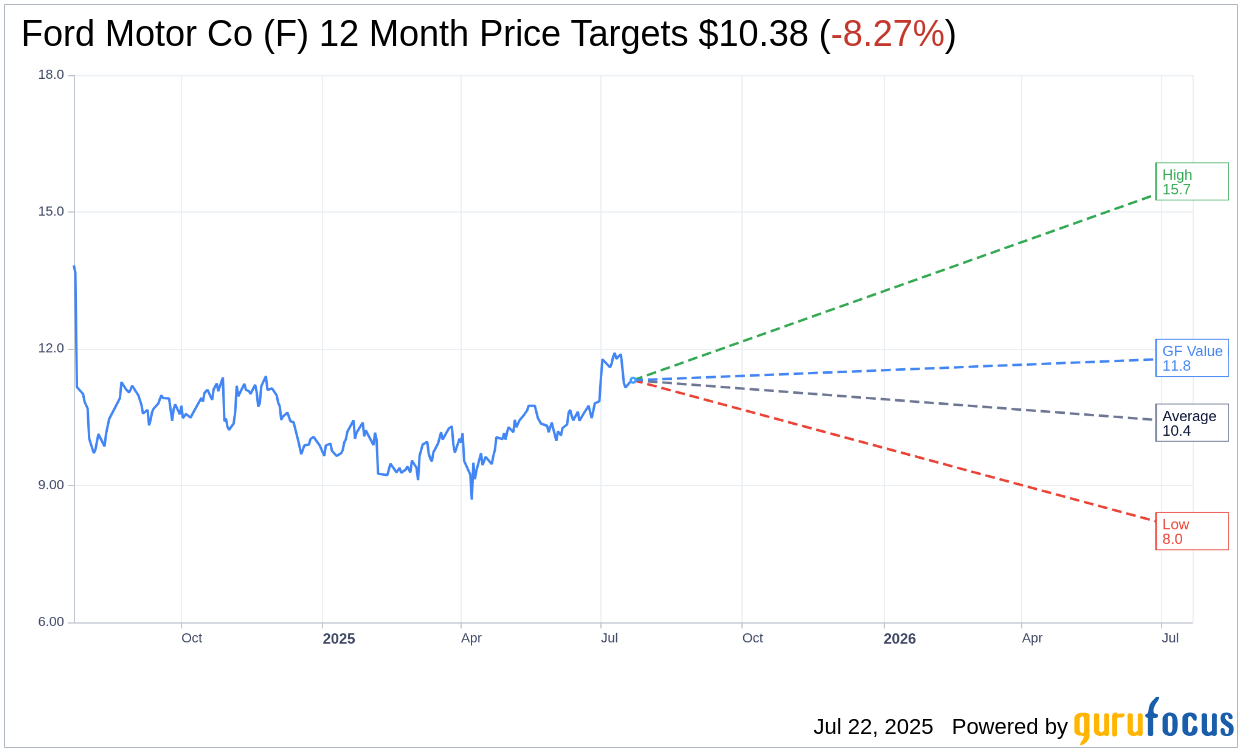ChargeScape, a collaborative venture involving Ford (F, Financial), BMW, Honda, and Nissan, has partnered with PSEG Long Island to enhance electric vehicle integration in the local power grid. This initiative, part of the utility’s Peak Load Reduction program, will utilize ChargeScape’s advanced AI technology to facilitate the connection of over 4,000 BMW and 2,200 Ford electric vehicles. The goal is to improve grid stability and community resilience by optimizing EV charging. Participants in the program will benefit from financial incentives as a reward for their involvement. This strategic move reflects a broader effort to efficiently manage energy use amid increasing electric vehicle adoption.
Wall Street Analysts Forecast

Based on the one-year price targets offered by 24 analysts, the average target price for Ford Motor Co (F, Financial) is $10.38 with a high estimate of $15.67 and a low estimate of $8.00. The average target implies an downside of 8.27% from the current price of $11.31. More detailed estimate data can be found on the Ford Motor Co (F) Forecast page.
Based on the consensus recommendation from 26 brokerage firms, Ford Motor Co's (F, Financial) average brokerage recommendation is currently 3.1, indicating "Hold" status. The rating scale ranges from 1 to 5, where 1 signifies Strong Buy, and 5 denotes Sell.
Based on GuruFocus estimates, the estimated GF Value for Ford Motor Co (F, Financial) in one year is $11.80, suggesting a upside of 4.33% from the current price of $11.31. GF Value is GuruFocus' estimate of the fair value that the stock should be traded at. It is calculated based on the historical multiples the stock has traded at previously, as well as past business growth and the future estimates of the business' performance. More detailed data can be found on the Ford Motor Co (F) Summary page.
F Key Business Developments
Release Date: May 05, 2025
- Revenue: $41 billion, down 5% year-over-year.
- EBIT: $1 billion, exceeding expectations of roughly breakeven for the quarter.
- Free Cash Flow: Use of $1.5 billion, impacted by unfavorable timing differences, net spending, and changes in working capital.
- Cash and Liquidity: Over $27 billion in cash and over $45 billion in liquidity as of March 31.
- Dividend: Declared a regular second-quarter dividend of $0.15 per share.
- Tariff Impact: Estimated gross adverse EBIT impact of $2.5 billion and net adverse EBIT impact of $1.5 billion for full-year 2025.
- Ford Pro Performance: Over 40% share of the US Class 1 truck and van market; 7% of all customer-paid repair orders from mobile repair.
- Model e Performance: US retail sales grew 15% in the quarter; first-quarter wholesale volumes more than doubled.
- Ford Blue Performance: Modest profit; Bronco sales grew 35%; hybrid mix of global sales increased 250 basis points.
- Ford Credit: EBT up significantly; $200 million distribution to the automotive company.
For the complete transcript of the earnings call, please refer to the full earnings call transcript.
Positive Points
- Ford Motor Co (F, Financial) achieved its best first-quarter US pickup sales in over 20 years, indicating strong demand for its vehicles.
- The company delivered $1 billion in EBIT, exceeding expectations of roughly breakeven for the quarter, driven by cost improvements and strong net pricing in North America.
- Ford Pro continues to be a competitive advantage, with strong demand for key products and growth in software subscriptions, which rose by 20% year over year.
- Ford and Lincoln were the most improved brands in J.D. Power's 2025 US Vehicle Dependability Study, highlighting improvements in quality.
- The company is on track to deliver $1 billion in net cost reductions this year, excluding the impact of changes in tariff policy.
Negative Points
- Ford Motor Co (F) suspended its full-year 2025 guidance due to uncertainties related to tariffs and potential industry-wide supply chain disruptions.
- The company estimated a gross adverse EBIT impact of $2.5 billion and a net adverse EBIT impact of $1.5 billion for full-year 2025 due to tariffs.
- Ford experienced a 7% decline in wholesales and a 5% decrease in revenue to $41 billion, partly due to planned downtime at several plants.
- The company faces potential challenges from competitors' responses to tariffs and related market dynamics, which could impact pricing and volume.
- Ford is dealing with uncertainties associated with tax and emissions policy, which could affect future operations and profitability.
